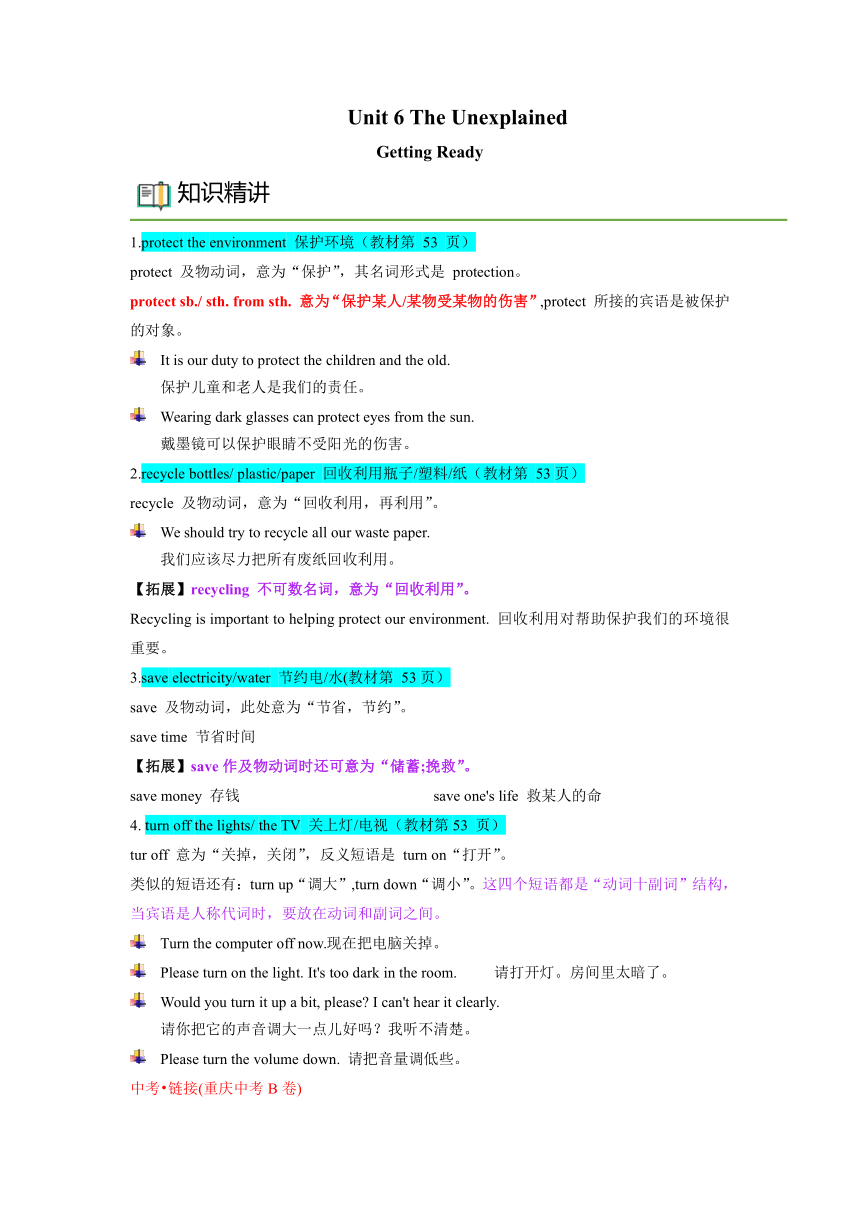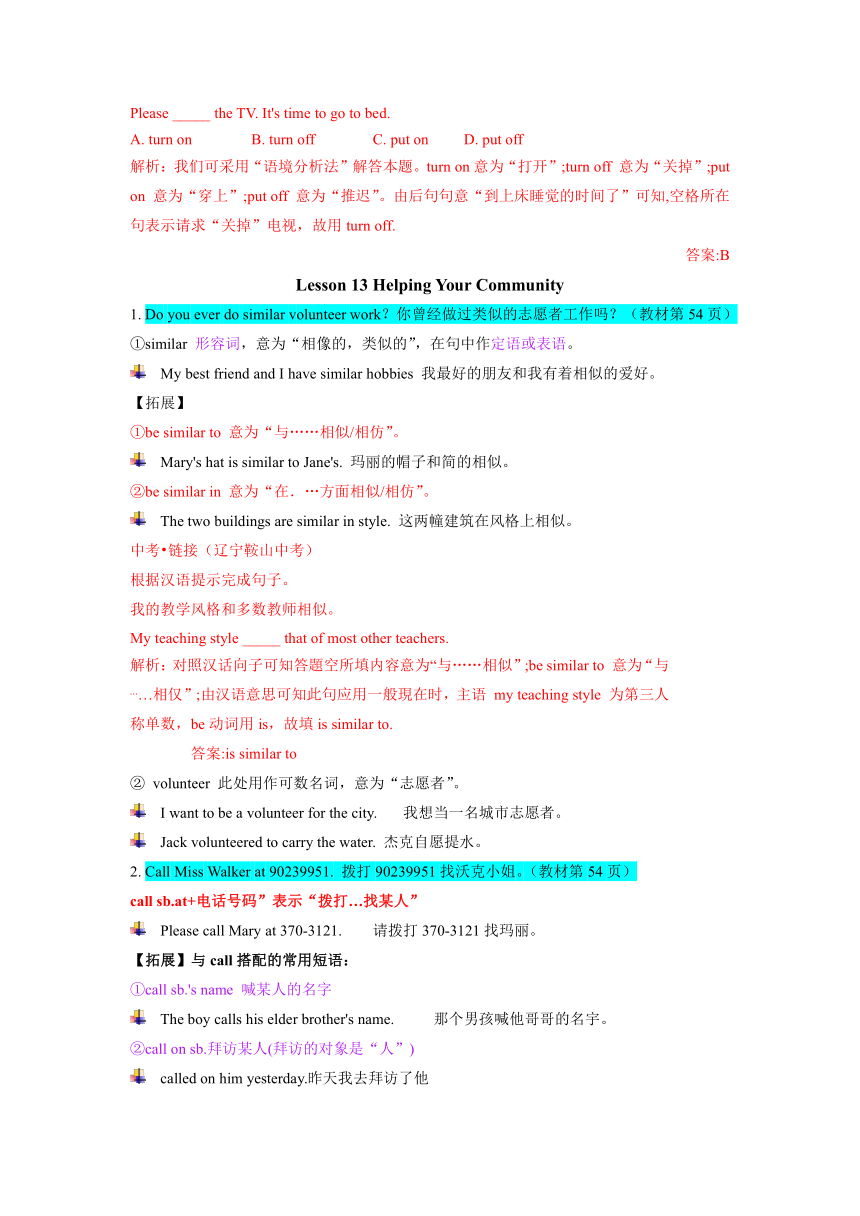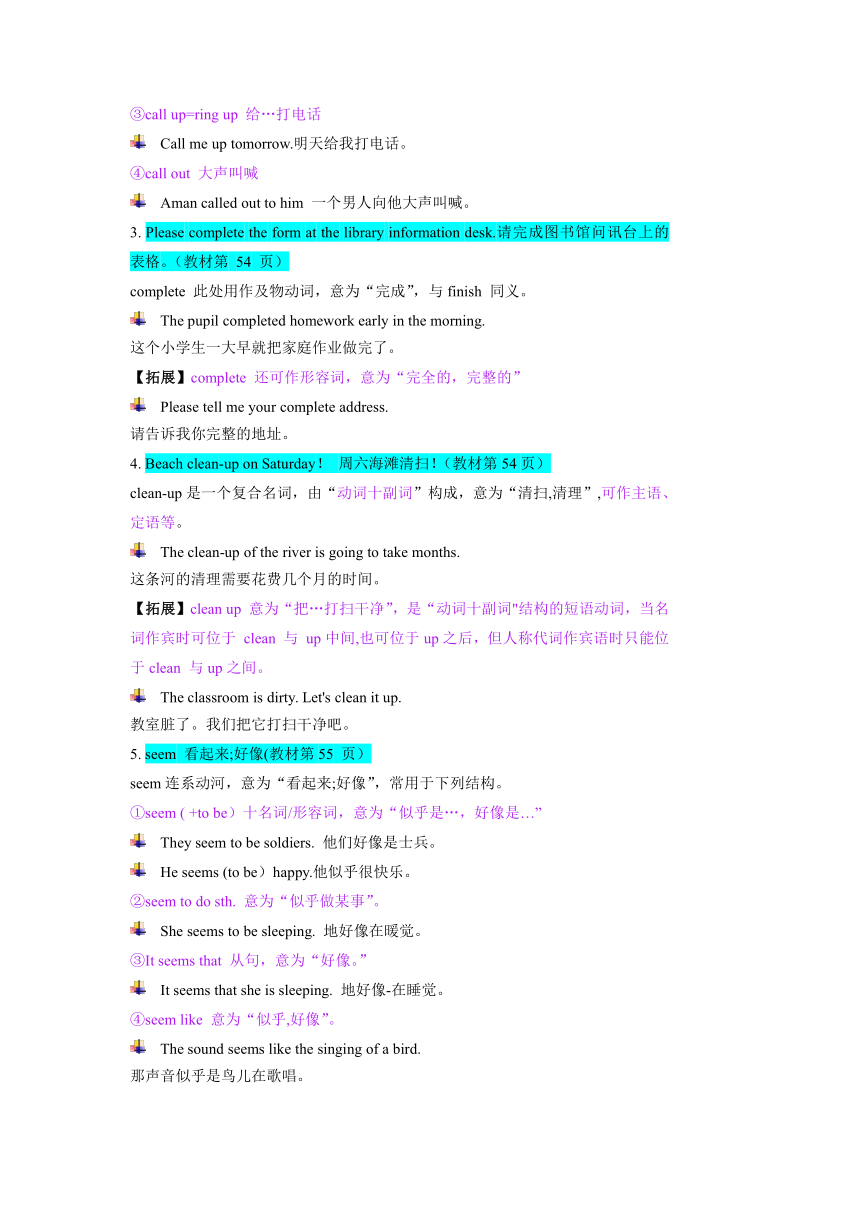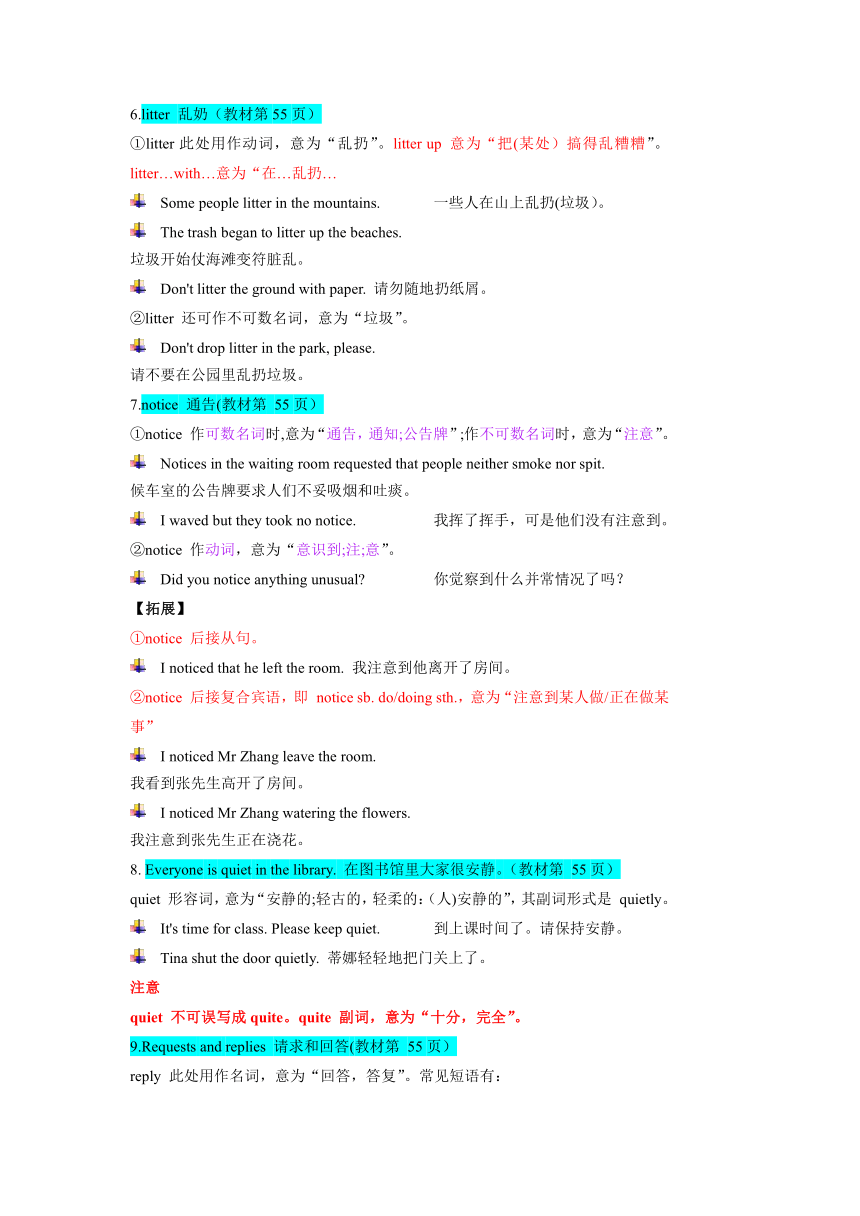Unit 5 Lesson 13-Lesson 14 要点全解2022-2023学年北师大版英语八年级上册
文档属性
| 名称 | Unit 5 Lesson 13-Lesson 14 要点全解2022-2023学年北师大版英语八年级上册 |

|
|
| 格式 | docx | ||
| 文件大小 | 47.8KB | ||
| 资源类型 | 教案 | ||
| 版本资源 | 北师大版 | ||
| 科目 | 英语 | ||
| 更新时间 | 2022-12-01 14:08:36 | ||
图片预览




文档简介
Unit 6 The Unexplained
Getting Ready
1.protect the environment 保护环境(教材第 53 页)
protect 及物动词,意为“保护”,其名词形式是 protection。
protect sb./ sth. from sth. 意为“保护某人/某物受某物的伤害”,protect 所接的宾语是被保护的对象。
It is our duty to protect the children and the old.
保护儿童和老人是我们的责任。
Wearing dark glasses can protect eyes from the sun.
戴墨镜可以保护眼睛不受阳光的伤害。
2.recycle bottles/ plastic/paper 回收利用瓶子/塑料/纸(教材第 53页)
recycle 及物动词,意为“回收利用,再利用”。
We should try to recycle all our waste paper.
我们应该尽力把所有废纸回收利用。
【拓展】recycling 不可数名词,意为“回收利用”。
Recycling is important to helping protect our environment. 回收利用对帮助保护我们的环境很重要。
3.save electricity/water 节约电/水(教材第 53页)
save 及物动词,此处意为“节省,节约”。
save time 节省时间
【拓展】save作及物动词时还可意为“储蓄;挽救”。
save money 存钱 save one's life 救某人的命
4. turn off the lights/ the TV 关上灯/电视(教材第53 页)
tur off 意为“关掉,关闭”,反义短语是 turn on“打开”。
类似的短语还有:turn up“调大”,turn down“调小”。这四个短语都是“动词十副词”结构,当宾语是人称代词时,要放在动词和副词之间。
Turn the computer off now.现在把电脑关掉。
Please turn on the light. It's too dark in the room. 请打开灯。房间里太暗了。
Would you turn it up a bit, please I can't hear it clearly.
请你把它的声音调大一点儿好吗?我听不清楚。
Please turn the volume down. 请把音量调低些。
中考 链接(重庆中考B卷)
Please _____ the TV. It's time to go to bed.
A. turn on B. turn off C. put on D. put off
解析:我们可采用“语境分析法”解答本题。turn on意为“打开”;turn off 意为“关掉”;put on 意为“穿上”;put off 意为“推迟”。由后句句意“到上床睡觉的时间了”可知,空格所在句表示请求“关掉”电视,故用turn off.
答案:B
Lesson 13 Helping Your Community
1. Do you ever do similar volunteer work?你曾经做过类似的志愿者工作吗?(教材第54页)
①similar 形容词,意为“相像的,类似的”,在句中作定语或表语。
My best friend and I have similar hobbies 我最好的朋友和我有着相似的爱好。
【拓展】
①be similar to 意为“与……相似/相仿”。
Mary's hat is similar to Jane's. 玛丽的帽子和简的相似。
②be similar in 意为“在.…方面相似/相仿”。
The two buildings are similar in style. 这两幢建筑在风格上相似。
中考 链接(辽宁鞍山中考)
根据汉语提示完成句子。
我的教学风格和多数教师相似。
My teaching style _____ that of most other teachers.
解析:对照汉话向子可知答題空所填内容意为“与……相似”;be similar to 意为“与 …相仅”;由汉语意思可知此句应用一般現在时,主语 my teaching style 为第三人称单数,be动词用is,故填is similar to. 答案:is similar to
② volunteer 此处用作可数名词,意为“志愿者”。
I want to be a volunteer for the city. 我想当一名城市志愿者。
Jack volunteered to carry the water. 杰克自愿提水。
2. Call Miss Walker at 90239951. 拨打90239951找沃克小姐。(教材第54页)
call sb.at+电话号码”表示“拨打…找某人”
Please call Mary at 370-3121. 请拨打370-3121找玛丽。
【拓展】与call搭配的常用短语:
①call sb.'s name 喊某人的名字
The boy calls his elder brother's name. 那个男孩喊他哥哥的名宇。
②call on sb.拜访某人(拜访的对象是“人”)
called on him yesterday.昨天我去拜访了他
③call up=ring up 给…打电话
Call me up tomorrow.明天给我打电话。
④call out 大声叫喊
Aman called out to him 一个男人向他大声叫喊。
3. Please complete the form at the library information desk.请完成图书馆问讯台上的表格。(教材第 54 页)
complete 此处用作及物动词,意为“完成”,与finish 同义。
The pupil completed homework early in the morning.
这个小学生一大早就把家庭作业做完了。
【拓展】complete 还可作形容词,意为“完全的,完整的”
Please tell me your complete address.
请告诉我你完整的地址。
4. Beach clean-up on Saturday! 周六海滩清扫!(教材第54页)
clean-up是一个复合名词,由“动词十副词”构成,意为“清扫,清理”,可作主语、定语等。
The clean-up of the river is going to take months.
这条河的清理需要花费几个月的时间。
【拓展】clean up 意为“把…打扫干净”,是“动词十副词"结构的短语动词,当名词作宾时可位于 clean 与 up中间,也可位于up之后,但人称代词作宾语时只能位于clean 与up之间。
The classroom is dirty. Let's clean it up.
教室脏了。我们把它打扫干净吧。
5. seem 看起来;好像(教材第55 页)
seem连系动河,意为“看起来;好像”,常用于下列结构。
①seem ( +to be)十名词/形容词,意为“似乎是…,好像是…”
They seem to be soldiers. 他们好像是士兵。
He seems (to be)happy.他似乎很快乐。
②seem to do sth. 意为“似乎做某事”。
She seems to be sleeping. 地好像在暖觉。
③It seems that 从句,意为“好像。”
It seems that she is sleeping. 地好像-在睡觉。
④seem like 意为“似乎,好像”。
The sound seems like the singing of a bird.
那声音似乎是鸟儿在歌唱。
6.litter 乱奶(教材第55页)
①litter此处用作动词,意为“乱扔”。litter up 意为“把(某处)搞得乱糟糟”。litter…with…意为“在…乱扔…
Some people litter in the mountains. 一些人在山上乱扔(垃圾)。
The trash began to litter up the beaches.
垃圾开始仗海滩变符脏乱。
Don't litter the ground with paper. 请勿随地扔纸屑。
②litter 还可作不可数名词,意为“垃圾”。
Don't drop litter in the park, please.
请不要在公园里乱扔垃圾。
7.notice 通告(教材第 55页)
①notice 作可数名词时,意为“通告,通知;公告牌”;作不可数名词时,意为“注意”。
Notices in the waiting room requested that people neither smoke nor spit.
候车室的公告牌要求人们不妥吸烟和吐痰。
I waved but they took no notice. 我挥了挥手,可是他们没有注意到。
②notice 作动词,意为“意识到;注;意”。
Did you notice anything unusual 你觉察到什么并常情况了吗?
【拓展】
①notice 后接从句。
I noticed that he left the room. 我注意到他离开了房间。
②notice 后接复合宾语,即 notice sb. do/doing sth.,意为“注意到某人做/正在做某事”
I noticed Mr Zhang leave the room.
我看到张先生高开了房间。
I noticed Mr Zhang watering the flowers.
我注意到张先生正在浇花。
8. Everyone is quiet in the library. 在图书馆里大家很安静。(教材第 55页)
quiet 形容词,意为“安静的;轻古的,轻柔的:(人)安静的”,其副词形式是 quietly。
It's time for class. Please keep quiet. 到上课时间了。请保持安静。
Tina shut the door quietly. 蒂娜轻轻地把门关上了。
注意
quiet 不可误写成quite。quite 副词,意为“十分,完全”。
9.Requests and replies 请求和回答(教材第 55页)
reply 此处用作名词,意为“回答,答复”。常见短语有:
make a reply 作答 make no reply 不作答复
I didn't hear his reply because of the noise.
因为噪音我没有听到他的回答。
I'll write a reply to his letter. 我会给他写回信的。
【拓展】reply 用作不及物动词时,其后要跟10 再接名词或代词作宾语,此时 reply 可answer替换;用作及物动词时其后常接宾语从句。
I'll reply to/answer your question at once.
我马上回答你的问题。
He replied that he knew nothing about it.
他回答说他对此一无所知。
辨析:reply 与 answer
①reply 为 正式用语,多指经过考虑后作出回答;answer为一般用语,常用于回答问题。
②answer 引1申为“应答”之类的意义时,不能用reply to代替。
answer the telephone 接电话(不能说成reply to the telephone)
③answer 用作名词,可意为“答案”,而reply无此意。
10. Just a second.稍等一会儿。(教材第 55页)
just a second 意为“一就一会儿,稍候”,相当于 just a moment。
Please wait just a second 请稍等。
Lesson 14 Helping Each Other
1. Fight with students if they are not polite. 如果学生们不礼貌的话,和他们打架。(教材第56 页)
fight此处用作不及物动词,意为“打架,战斗”。常与介词with 或 against 连用。
My little brother is always fighting with his classmates.
我的小弟弟总是与他的同班同学打架。
They fought against the enemy fiercely. 他们猛烈地与敌人战斗。
【拓展】
① fight 可作及物动词,意为“与…斗争;反对”,可直接跟宾语。
They fought their enemies bravely. 他们勇敢地与敌人斗争。
②fight 还可作名词,意为“打架,打斗”。
have a fight with sb. 意为“与某人打架”,与 fight with sb.同义。
Don't have a fight with each other. 不要相互打架。
2. Laugh at your classmates’ mistakes. 嘲笑 你同班同学的错误。(教材第 56 页)
laugh at意为“嘲笑,讥笑,因…而发笑”。
Don't laugh at people in trouble 不要嘲笑处在困境中的人。
辦析:laugh 与 smile
laugh 一般表示“出声地(大)笑”,不但有面部表情,而且还有声音
laugh at …意为“嘲笑…;因…而发笑”
smile 一般表示“无声地微笑”指的是面部表情
smile at…意为“向…微笑”
We laughed at his jokes. 我们听了他的笑话都笑了。
He smiled at me. 他朝我微笑。
3. Avoid cleaning your classroom逃避打扫你们的教室。(教材第 56页)
avoid 及物动词,意为“避免,逃避”,至指经过事先考感,故意避开不想见的人或预料中的事情,后可接名词、代词或动名词,不可接动词不定式。
You'd better avoid reading in the train
你最好避免在火车上阅读。
I realised he was trying to avoid the topic.
我意识到他正在设法避开这个话題。
4. Be friendly to new students. 对新同学友好。(教材第56 页)
friendly 形容词,意为“友好的”,friend 名词,意为“朋友”,friendship 名词,意为“友谊”。be friendly to sb. 意为“对某人友好”。
Our English teacher is very friendly to us.
我们的英语老师对我们很友好。
注意
类似的以-1y结尾的形容词还有:
lovely 可爱的 lonely 环独的 lively 生动的 ugly丑的 silly 傻的
5. Actually,it was my first day at my new school.事实上,这是我在新学校的第一天。(教材第 56 页)
actually副词,意为“事实上;实际上”,与 in fact同义。
She looks young, but she's actually 50. = She looks young,but in fact she's 50.
她看上去很年轻,可是实际上她50岁了。
6. She was riding on ice when suddenly she fell off her bike a few steps in front of me.她正骑车行驶在冰上,突然在我前面几步远的地方从自行车上摔下来了。(教材第56页)
fall off意为“(从…)跌落,下降”。fell在此处是fall 的过去式。
He fell off the tree.他从树上跌落下来。
【拓展】与 fall 有关的常用短语:
fall asleep 入睡 fall behind 落后 fall over 绊倒;倒下
fall in love with...爱上…. fall into 落人:陷人 fall down 倒塌
7. Without thinking, I went over and helped her stand up. 没有多想,我走过去帮她站起来。(教材第56页)
①without 介词,意为“没有:不(做某事)”。其后可跟动名词、人称代词宾格或名词。without 的反义词为 with。
He left the room without saying a word.
他一句话也没说就高开了房间。
中考·链接(湖北孝感中考)
——Reading is a good way to spend the time on the plane
——That's true. I never go travelling _____ a book,
A. without B. from C. on D. about
解析:我们可采用“逻辑推理法”解答术題。without意为“没有”,from 感为“来自”。on意为“关于,在……上”about意为“关于”。由前句句意“阅读是在飞机上打发时问的好方式”和应答语前句“那是真的”可知,应答语后向应意为“我去旅行必常书”,即〝我”从不会不带书去旅行。 答案:A
② go over 是“动词十副词”型短语,此处意为“过去,
Let's go over and help them pull the cart.
咱们过去帮他们拉车吧。
I’ll go over and take a look. 我会过去看一看。
【拓展】go over 还意为“复习”。
Let's go over the new words让我们来复习一下生词吧。
8. The teacher led me to the classroom and asked me to sit down beside a girl. 老师把我领到教室,并要我在一个女孩旁边坐下。(数材第 56页)
lead 此处用作及物动词,意为“带领,引导”。其过去式led.
Please lead the guest to his room. 请领客人到他的房間。
Who will lead the party in the next election
下一届选举中谁会领导这个党派?
【拓展】①lead 可作不及物动词,意为“通向;领路”。
All roads lead to Rome.(谚语)条条大路通罗马。
②与 lead 有关的常见短语:
lead to 通向;导致 lead a(n)... life 过着…的生活 lead sb. to do sth. 引 某人做某事
9. I knew some of the students were looking at me but I didn't dare to look at them. 我知道一些同学正看者我,但我不敢看他们。(教材第 56页)
dare 此处用作实义动词,意为“敢于,胆敢”,此时 dare有人称和数的变化。在肯定向中,dare后常接带to 的动词不定式:在否定句或疑向句中,dare 后接帶 to 式不帯 to的动词不定式均可。
I dare to swim across the river. 我敢游过这条河。
He doesn't dare (to) answer. 他不敢回答。
【拓展】dare 可用作情态动词,此时 dare 没有人称和数的变化,主要用于疑问句、否定句或条件从句中,一般不用于肯定句中。
How dare you say I'm unfair 你怎么敢说我不公平?
If he dare break the rule, someone will punish him
如果他敢破坏规定,有人会惩罚他。
10. They used a different textbook from my old school and l didn't have a copy,他们使用和我以前的学校不同的课本,(所以)我没有一本。(教材第 56 页)
copy 此处用作可数名词,意为“一本,一册;复印件”
He was reading a copy of People's Daily.
他正在看一份《人民日报》。
The painting is a copy of one in the museum.
这幅画是博物馆中的一副画的复制品。
【拓展】copy 可用作动词意为“复制;抄写;抄袭”
I copied the data into a notebook.
我把数据抄在了一个笔记本上。
The teacher punished him for copying.
她因抄袭而受到老师的处罚。
11.As I was wondering what to do,a book appeared in front of me. 正当我在考虑怎么办时,一本书出现在我面前。(教材第56页)
appear 不及物动词,意为“出现”。其反义词为disappear,意为“消失,失踪”。其名词形式为 appearance,意为“出现;外貌”。
He suddenly appeared in front of us. 他突然出现在我们面前。
Don't judge anything by appearance. 不要根据外表来判断任何事物。
12.From then on , we became good friends. 从那以后,我们成了好朋友。(教材第56页)
from then on 意为“从那以后”,多用于一般过去时。
Kate began to learn English from then on. 从那以后凯特就开始学习英语。
【拓展】from now on 意为“从现在开始”,多用于一般将来时。
I'm going to work hard at English from now on.
从现在开始我要努力学习英语。
13. Chris often gets nervous before he makes a speech in public.克里斯经常 在公开演讲之前紧张不安。(教材第57页)
①make a speech 意为“演讲,作演讲”,其同义短语为give a speech。 make a speech on/about …意为“作一个关于…的演讲”。
We'll invite Mr Brown to make a speech. 我们将邀请布朗先生作演讲。
② in public 意为“公开地;当众”,为固定短语。此时 public作名词。
I don't want to speak about it in public. 我不想当众说这件事。
We shouldn't spit in public 我们不应该在公共场所吐痰。
【拓展】public 还可作形容词,意为“公开的,公共的,公众的”。 in a public place (=in public) 在公共场合 a public telephone 公用电话
14. I was lying (tie) in bed when you called me. 你打电话给我时,我正躺在床上。(教材第 57页)
lie 动词,此处意为“平躺”。其过去式为 lay,现在分词为 lying。
Look! A dog is lying on the ground. 看!一条狗正躺在地上。
【拓展】
①lie 用作动词时还意为“平放”。
The book lay open on the desk. 那本书摊开放在桌子上。
②lie 用作动词时还意为“说谎”,其过去式为 lied,现在分词为 lying。
Don't lie to me! 别对
Getting Ready
1.protect the environment 保护环境(教材第 53 页)
protect 及物动词,意为“保护”,其名词形式是 protection。
protect sb./ sth. from sth. 意为“保护某人/某物受某物的伤害”,protect 所接的宾语是被保护的对象。
It is our duty to protect the children and the old.
保护儿童和老人是我们的责任。
Wearing dark glasses can protect eyes from the sun.
戴墨镜可以保护眼睛不受阳光的伤害。
2.recycle bottles/ plastic/paper 回收利用瓶子/塑料/纸(教材第 53页)
recycle 及物动词,意为“回收利用,再利用”。
We should try to recycle all our waste paper.
我们应该尽力把所有废纸回收利用。
【拓展】recycling 不可数名词,意为“回收利用”。
Recycling is important to helping protect our environment. 回收利用对帮助保护我们的环境很重要。
3.save electricity/water 节约电/水(教材第 53页)
save 及物动词,此处意为“节省,节约”。
save time 节省时间
【拓展】save作及物动词时还可意为“储蓄;挽救”。
save money 存钱 save one's life 救某人的命
4. turn off the lights/ the TV 关上灯/电视(教材第53 页)
tur off 意为“关掉,关闭”,反义短语是 turn on“打开”。
类似的短语还有:turn up“调大”,turn down“调小”。这四个短语都是“动词十副词”结构,当宾语是人称代词时,要放在动词和副词之间。
Turn the computer off now.现在把电脑关掉。
Please turn on the light. It's too dark in the room. 请打开灯。房间里太暗了。
Would you turn it up a bit, please I can't hear it clearly.
请你把它的声音调大一点儿好吗?我听不清楚。
Please turn the volume down. 请把音量调低些。
中考 链接(重庆中考B卷)
Please _____ the TV. It's time to go to bed.
A. turn on B. turn off C. put on D. put off
解析:我们可采用“语境分析法”解答本题。turn on意为“打开”;turn off 意为“关掉”;put on 意为“穿上”;put off 意为“推迟”。由后句句意“到上床睡觉的时间了”可知,空格所在句表示请求“关掉”电视,故用turn off.
答案:B
Lesson 13 Helping Your Community
1. Do you ever do similar volunteer work?你曾经做过类似的志愿者工作吗?(教材第54页)
①similar 形容词,意为“相像的,类似的”,在句中作定语或表语。
My best friend and I have similar hobbies 我最好的朋友和我有着相似的爱好。
【拓展】
①be similar to 意为“与……相似/相仿”。
Mary's hat is similar to Jane's. 玛丽的帽子和简的相似。
②be similar in 意为“在.…方面相似/相仿”。
The two buildings are similar in style. 这两幢建筑在风格上相似。
中考 链接(辽宁鞍山中考)
根据汉语提示完成句子。
我的教学风格和多数教师相似。
My teaching style _____ that of most other teachers.
解析:对照汉话向子可知答題空所填内容意为“与……相似”;be similar to 意为“与 …相仅”;由汉语意思可知此句应用一般現在时,主语 my teaching style 为第三人称单数,be动词用is,故填is similar to. 答案:is similar to
② volunteer 此处用作可数名词,意为“志愿者”。
I want to be a volunteer for the city. 我想当一名城市志愿者。
Jack volunteered to carry the water. 杰克自愿提水。
2. Call Miss Walker at 90239951. 拨打90239951找沃克小姐。(教材第54页)
call sb.at+电话号码”表示“拨打…找某人”
Please call Mary at 370-3121. 请拨打370-3121找玛丽。
【拓展】与call搭配的常用短语:
①call sb.'s name 喊某人的名字
The boy calls his elder brother's name. 那个男孩喊他哥哥的名宇。
②call on sb.拜访某人(拜访的对象是“人”)
called on him yesterday.昨天我去拜访了他
③call up=ring up 给…打电话
Call me up tomorrow.明天给我打电话。
④call out 大声叫喊
Aman called out to him 一个男人向他大声叫喊。
3. Please complete the form at the library information desk.请完成图书馆问讯台上的表格。(教材第 54 页)
complete 此处用作及物动词,意为“完成”,与finish 同义。
The pupil completed homework early in the morning.
这个小学生一大早就把家庭作业做完了。
【拓展】complete 还可作形容词,意为“完全的,完整的”
Please tell me your complete address.
请告诉我你完整的地址。
4. Beach clean-up on Saturday! 周六海滩清扫!(教材第54页)
clean-up是一个复合名词,由“动词十副词”构成,意为“清扫,清理”,可作主语、定语等。
The clean-up of the river is going to take months.
这条河的清理需要花费几个月的时间。
【拓展】clean up 意为“把…打扫干净”,是“动词十副词"结构的短语动词,当名词作宾时可位于 clean 与 up中间,也可位于up之后,但人称代词作宾语时只能位于clean 与up之间。
The classroom is dirty. Let's clean it up.
教室脏了。我们把它打扫干净吧。
5. seem 看起来;好像(教材第55 页)
seem连系动河,意为“看起来;好像”,常用于下列结构。
①seem ( +to be)十名词/形容词,意为“似乎是…,好像是…”
They seem to be soldiers. 他们好像是士兵。
He seems (to be)happy.他似乎很快乐。
②seem to do sth. 意为“似乎做某事”。
She seems to be sleeping. 地好像在暖觉。
③It seems that 从句,意为“好像。”
It seems that she is sleeping. 地好像-在睡觉。
④seem like 意为“似乎,好像”。
The sound seems like the singing of a bird.
那声音似乎是鸟儿在歌唱。
6.litter 乱奶(教材第55页)
①litter此处用作动词,意为“乱扔”。litter up 意为“把(某处)搞得乱糟糟”。litter…with…意为“在…乱扔…
Some people litter in the mountains. 一些人在山上乱扔(垃圾)。
The trash began to litter up the beaches.
垃圾开始仗海滩变符脏乱。
Don't litter the ground with paper. 请勿随地扔纸屑。
②litter 还可作不可数名词,意为“垃圾”。
Don't drop litter in the park, please.
请不要在公园里乱扔垃圾。
7.notice 通告(教材第 55页)
①notice 作可数名词时,意为“通告,通知;公告牌”;作不可数名词时,意为“注意”。
Notices in the waiting room requested that people neither smoke nor spit.
候车室的公告牌要求人们不妥吸烟和吐痰。
I waved but they took no notice. 我挥了挥手,可是他们没有注意到。
②notice 作动词,意为“意识到;注;意”。
Did you notice anything unusual 你觉察到什么并常情况了吗?
【拓展】
①notice 后接从句。
I noticed that he left the room. 我注意到他离开了房间。
②notice 后接复合宾语,即 notice sb. do/doing sth.,意为“注意到某人做/正在做某事”
I noticed Mr Zhang leave the room.
我看到张先生高开了房间。
I noticed Mr Zhang watering the flowers.
我注意到张先生正在浇花。
8. Everyone is quiet in the library. 在图书馆里大家很安静。(教材第 55页)
quiet 形容词,意为“安静的;轻古的,轻柔的:(人)安静的”,其副词形式是 quietly。
It's time for class. Please keep quiet. 到上课时间了。请保持安静。
Tina shut the door quietly. 蒂娜轻轻地把门关上了。
注意
quiet 不可误写成quite。quite 副词,意为“十分,完全”。
9.Requests and replies 请求和回答(教材第 55页)
reply 此处用作名词,意为“回答,答复”。常见短语有:
make a reply 作答 make no reply 不作答复
I didn't hear his reply because of the noise.
因为噪音我没有听到他的回答。
I'll write a reply to his letter. 我会给他写回信的。
【拓展】reply 用作不及物动词时,其后要跟10 再接名词或代词作宾语,此时 reply 可answer替换;用作及物动词时其后常接宾语从句。
I'll reply to/answer your question at once.
我马上回答你的问题。
He replied that he knew nothing about it.
他回答说他对此一无所知。
辨析:reply 与 answer
①reply 为 正式用语,多指经过考虑后作出回答;answer为一般用语,常用于回答问题。
②answer 引1申为“应答”之类的意义时,不能用reply to代替。
answer the telephone 接电话(不能说成reply to the telephone)
③answer 用作名词,可意为“答案”,而reply无此意。
10. Just a second.稍等一会儿。(教材第 55页)
just a second 意为“一就一会儿,稍候”,相当于 just a moment。
Please wait just a second 请稍等。
Lesson 14 Helping Each Other
1. Fight with students if they are not polite. 如果学生们不礼貌的话,和他们打架。(教材第56 页)
fight此处用作不及物动词,意为“打架,战斗”。常与介词with 或 against 连用。
My little brother is always fighting with his classmates.
我的小弟弟总是与他的同班同学打架。
They fought against the enemy fiercely. 他们猛烈地与敌人战斗。
【拓展】
① fight 可作及物动词,意为“与…斗争;反对”,可直接跟宾语。
They fought their enemies bravely. 他们勇敢地与敌人斗争。
②fight 还可作名词,意为“打架,打斗”。
have a fight with sb. 意为“与某人打架”,与 fight with sb.同义。
Don't have a fight with each other. 不要相互打架。
2. Laugh at your classmates’ mistakes. 嘲笑 你同班同学的错误。(教材第 56 页)
laugh at意为“嘲笑,讥笑,因…而发笑”。
Don't laugh at people in trouble 不要嘲笑处在困境中的人。
辦析:laugh 与 smile
laugh 一般表示“出声地(大)笑”,不但有面部表情,而且还有声音
laugh at …意为“嘲笑…;因…而发笑”
smile 一般表示“无声地微笑”指的是面部表情
smile at…意为“向…微笑”
We laughed at his jokes. 我们听了他的笑话都笑了。
He smiled at me. 他朝我微笑。
3. Avoid cleaning your classroom逃避打扫你们的教室。(教材第 56页)
avoid 及物动词,意为“避免,逃避”,至指经过事先考感,故意避开不想见的人或预料中的事情,后可接名词、代词或动名词,不可接动词不定式。
You'd better avoid reading in the train
你最好避免在火车上阅读。
I realised he was trying to avoid the topic.
我意识到他正在设法避开这个话題。
4. Be friendly to new students. 对新同学友好。(教材第56 页)
friendly 形容词,意为“友好的”,friend 名词,意为“朋友”,friendship 名词,意为“友谊”。be friendly to sb. 意为“对某人友好”。
Our English teacher is very friendly to us.
我们的英语老师对我们很友好。
注意
类似的以-1y结尾的形容词还有:
lovely 可爱的 lonely 环独的 lively 生动的 ugly丑的 silly 傻的
5. Actually,it was my first day at my new school.事实上,这是我在新学校的第一天。(教材第 56 页)
actually副词,意为“事实上;实际上”,与 in fact同义。
She looks young, but she's actually 50. = She looks young,but in fact she's 50.
她看上去很年轻,可是实际上她50岁了。
6. She was riding on ice when suddenly she fell off her bike a few steps in front of me.她正骑车行驶在冰上,突然在我前面几步远的地方从自行车上摔下来了。(教材第56页)
fall off意为“(从…)跌落,下降”。fell在此处是fall 的过去式。
He fell off the tree.他从树上跌落下来。
【拓展】与 fall 有关的常用短语:
fall asleep 入睡 fall behind 落后 fall over 绊倒;倒下
fall in love with...爱上…. fall into 落人:陷人 fall down 倒塌
7. Without thinking, I went over and helped her stand up. 没有多想,我走过去帮她站起来。(教材第56页)
①without 介词,意为“没有:不(做某事)”。其后可跟动名词、人称代词宾格或名词。without 的反义词为 with。
He left the room without saying a word.
他一句话也没说就高开了房间。
中考·链接(湖北孝感中考)
——Reading is a good way to spend the time on the plane
——That's true. I never go travelling _____ a book,
A. without B. from C. on D. about
解析:我们可采用“逻辑推理法”解答术題。without意为“没有”,from 感为“来自”。on意为“关于,在……上”about意为“关于”。由前句句意“阅读是在飞机上打发时问的好方式”和应答语前句“那是真的”可知,应答语后向应意为“我去旅行必常书”,即〝我”从不会不带书去旅行。 答案:A
② go over 是“动词十副词”型短语,此处意为“过去,
Let's go over and help them pull the cart.
咱们过去帮他们拉车吧。
I’ll go over and take a look. 我会过去看一看。
【拓展】go over 还意为“复习”。
Let's go over the new words让我们来复习一下生词吧。
8. The teacher led me to the classroom and asked me to sit down beside a girl. 老师把我领到教室,并要我在一个女孩旁边坐下。(数材第 56页)
lead 此处用作及物动词,意为“带领,引导”。其过去式led.
Please lead the guest to his room. 请领客人到他的房間。
Who will lead the party in the next election
下一届选举中谁会领导这个党派?
【拓展】①lead 可作不及物动词,意为“通向;领路”。
All roads lead to Rome.(谚语)条条大路通罗马。
②与 lead 有关的常见短语:
lead to 通向;导致 lead a(n)... life 过着…的生活 lead sb. to do sth. 引 某人做某事
9. I knew some of the students were looking at me but I didn't dare to look at them. 我知道一些同学正看者我,但我不敢看他们。(教材第 56页)
dare 此处用作实义动词,意为“敢于,胆敢”,此时 dare有人称和数的变化。在肯定向中,dare后常接带to 的动词不定式:在否定句或疑向句中,dare 后接帶 to 式不帯 to的动词不定式均可。
I dare to swim across the river. 我敢游过这条河。
He doesn't dare (to) answer. 他不敢回答。
【拓展】dare 可用作情态动词,此时 dare 没有人称和数的变化,主要用于疑问句、否定句或条件从句中,一般不用于肯定句中。
How dare you say I'm unfair 你怎么敢说我不公平?
If he dare break the rule, someone will punish him
如果他敢破坏规定,有人会惩罚他。
10. They used a different textbook from my old school and l didn't have a copy,他们使用和我以前的学校不同的课本,(所以)我没有一本。(教材第 56 页)
copy 此处用作可数名词,意为“一本,一册;复印件”
He was reading a copy of People's Daily.
他正在看一份《人民日报》。
The painting is a copy of one in the museum.
这幅画是博物馆中的一副画的复制品。
【拓展】copy 可用作动词意为“复制;抄写;抄袭”
I copied the data into a notebook.
我把数据抄在了一个笔记本上。
The teacher punished him for copying.
她因抄袭而受到老师的处罚。
11.As I was wondering what to do,a book appeared in front of me. 正当我在考虑怎么办时,一本书出现在我面前。(教材第56页)
appear 不及物动词,意为“出现”。其反义词为disappear,意为“消失,失踪”。其名词形式为 appearance,意为“出现;外貌”。
He suddenly appeared in front of us. 他突然出现在我们面前。
Don't judge anything by appearance. 不要根据外表来判断任何事物。
12.From then on , we became good friends. 从那以后,我们成了好朋友。(教材第56页)
from then on 意为“从那以后”,多用于一般过去时。
Kate began to learn English from then on. 从那以后凯特就开始学习英语。
【拓展】from now on 意为“从现在开始”,多用于一般将来时。
I'm going to work hard at English from now on.
从现在开始我要努力学习英语。
13. Chris often gets nervous before he makes a speech in public.克里斯经常 在公开演讲之前紧张不安。(教材第57页)
①make a speech 意为“演讲,作演讲”,其同义短语为give a speech。 make a speech on/about …意为“作一个关于…的演讲”。
We'll invite Mr Brown to make a speech. 我们将邀请布朗先生作演讲。
② in public 意为“公开地;当众”,为固定短语。此时 public作名词。
I don't want to speak about it in public. 我不想当众说这件事。
We shouldn't spit in public 我们不应该在公共场所吐痰。
【拓展】public 还可作形容词,意为“公开的,公共的,公众的”。 in a public place (=in public) 在公共场合 a public telephone 公用电话
14. I was lying (tie) in bed when you called me. 你打电话给我时,我正躺在床上。(教材第 57页)
lie 动词,此处意为“平躺”。其过去式为 lay,现在分词为 lying。
Look! A dog is lying on the ground. 看!一条狗正躺在地上。
【拓展】
①lie 用作动词时还意为“平放”。
The book lay open on the desk. 那本书摊开放在桌子上。
②lie 用作动词时还意为“说谎”,其过去式为 lied,现在分词为 lying。
Don't lie to me! 别对
同课章节目录
- Unit 1 Television
- Lesson 1 Last Week on TV
- Lesson 2 An Interview on TV
- Lesson 3 The Big Game
- Communication Workshop
- Unit 2 Teams
- Lesson 4 Class Projects
- Lesson 5 Teamwork
- Lesson 6 A Special Team
- Communication Workshop
- Unit 3 Faster,Higher,Stronge
- Lesson 7 Time to Exercise
- Lesson 8 Olympic Winners
- Lesson 9 Never Give Up!
- Communication Workshop
- Unit 4 Healthy Living
- Lesson 10 Going to the Doctor
- Lesson 11 Health Advice
- Lesson 12 Healthy Bones
- Communication Workshop
- Unit 5 Helping
- Lesson 13 Helping Your Community
- Lesson 14 Helping Each Other
- Lesson 15 A Young Hero
- Communication Workshop
- Unit 6 The Unexplained
- Lesson 16 Natural Abilities
- Lesson 17 True Stories?
- Lesson 18 Dreams
- Communication Workshop
